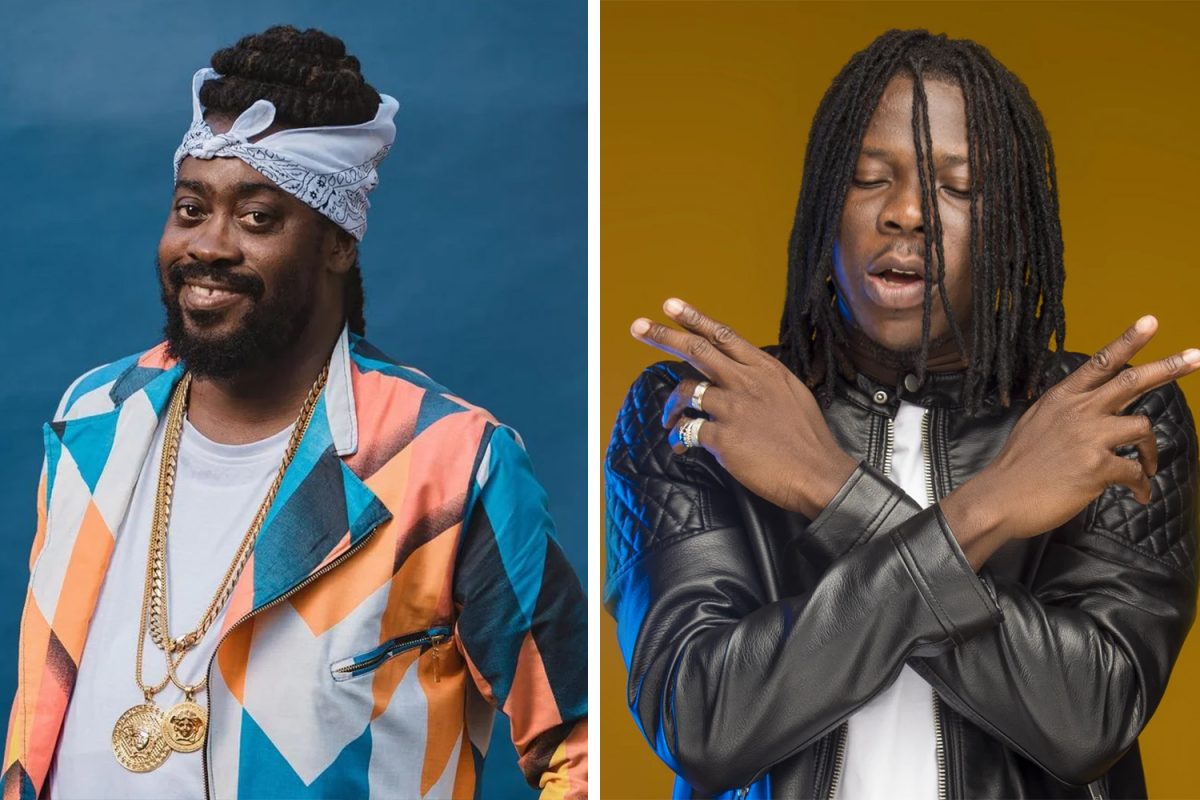Beenie Man Declares Stonebwoy The “Prince of Dancehall”

Dancehall icon Beenie Man has declared Ghanaian artist Stonebwoy the “Prince of Dancehall”.
Beenie Man made his proclamation on Monday, during an interview on Okay 101.7FM, a day after he and his team arrived in Accra, Ghana for Stonebwoy’s highly-anticipated Bhim Concert, which both men will be headlining at the Grand Arena in the country’s capital on Tuesday.
The BHIM Concert, which is held annually is being staged for the fifth time and is organized by Stonebwoy and his Burniton Music Group.
During the Okay FM interview, Beenie said he had met the now 33-year-old, during a previous trip to Ghana when the Activate artist was in his teens.
“I know him from he was like what 16, 17… but I always thought he was a Jamaican that trapped in Africa, till him speak him original language,” Beenie told host Ekwanso Dwoodwoo.
“He’s my son. It’s a father and son relationship. It’s about the king a dancehall and the prince a Dancehall…,” Beenie Man started, evoking excitement from the Dwoodwoo, who said Stonebwoy was now the heir apparent to the Dancehall throne.
“You heard dat Africa? You heard dat! Di King and di Prince. Di King of Dancehall speaking. King Beenie Man says dat! So that is the heir; the son, that is the heir…” the delighted host said.
“I am not fighting nobody, I am not killing nobody; I am not hengin nobaddy, but he is my son. He’s my son and he is showing his respect. And he is showing his talent and he is showing his effort and his dedication to the music and he is showing his life to Ghana,” Beenie Man declared.
On Monday, Stonebwoy also took Beenie man on a tour to the town of Ashaiman, where he was born and bred, where they toured a food market, with doting fans in tow.
They were also guests on Prime Morning, where Beenie hailed Stonebwoy for his musical accomplishments, pointing out that he is but one of the few artists promoting Ghana positively on the international market through his music.
“Stonebwoy is not my really friend, he is not my companion. He is my son,” the Slam artist told the interviewer.
“When it comes to music, Stonebwoy is a genius and I respect him for that. He’s an artist who has always put himself in a place where people can know to say yeah, this is Ghana,” he also stated, later pointing out that he intended to do additional collabs with the African and also called for more collabs between Jamaican and Ghanaian artistes.
Beenie Man and Stonebwoy have so far recorded one song together, titled Shuga, which was released in April 2019.
The Ghananian has collaborated with a slew of other Jamaican artists including Kranium on Talk to Me, was featured on Sean Paul’s Live N Livin album on the remix of Guns of Navarone, teamed up with Kabaka Pyramid on Suit and Tie and Borders; Morgan Heritage with Africa x Jamaica, Motion with Jahmiel and Happiness with Jah Vinci.
Beenie Man’s declaration is in stark contrast to the sentiments of acting president of the Musicians Union of Ghana (MUSIGA), Bessa Simons, who, in a radio interview, several months ago, said that Ghanaian artists were copycatting Jamaicans and passing off Highlife music as Reggae and Dancehall.
In the interview on Asempa FM, Simons, who is himself a Highlife artist, had said all his Ghananian compatriots who claim to be topping the Dancehall genre including Stonebwoy and Shatta Wale are mostly doing “Highlife music” and not Reggae or Dancehall.
He had also said that he believed Ghanaian musicians were shying away from the highlife music”, due primarily to financial expediency.
“It could be highlife isn’t profitable or they don’t know where to take highlife because in our music world, there are other markets. Music there are vast markets…,” he said.
Ghanaian Highlife music, which emerged in the 1880s is one of the oldest popular dance-music styles of Africa and is described as “a fusion of rhythms from the West African coast and those from Europe, and black people from both South and North America”, which is played with Western instruments, but uses the melodic and main rhythmic structures of traditional Akan music and Kpanlogo Music of the Ghanaian people.
Simons, said at the time that the Ghananian musicians were only mimicking the style of Reggae/Dancehall acts but they cannot be identified as such as they were “not born in Jamaica”.
“They are singing Highlife. Ask any better musician and they will tell you. Were they born in Jamaica? They are only trying to copy the Jamaicans,” the Belembe singer said.
In August, 2020, Simons was reported by Ghana’s Power 97.9FM, as making similar comments that “there is no real Dancehall musician in Ghana” and that “acclaimed dancehall musicians in the country are doing highlife music and not the Jamaican genre”.
“My friend you are singing highlife, you grew up in Ghana… I have also worked with Jamaicans, I even worked with pioneers of reggae music, I know how they play music, ours too, when you fuse Dancehall and others. All what they sing let me tell them they’re singing highlife,” he is quoted as saying.
